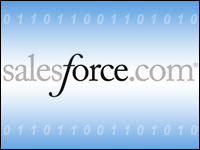
I had the pleasure of attending two events last week: Microsoft Convergence 2010 in Atlanta and the Salesforce-VMware VMforce.com announcement in San Francisco. Each event was useful and informative in its own way, and I am pleased to have witnessed each first-hand. I have written exhaustively — at least I’m tired — about each of these, so rather than another recitation of events, I want to spend this piece drilling into one aspect.
Terminology was common and different in the two events, and it’s worth looking at. The term de jour is “cloud computing” and it has been current for at least 10 minutes — more like about two years. We know it’s the “in” thing because until very recently both Salesforce and Microsoft were using it, albeit in very different contexts.
A couple of years ago, Salesforce and a few other intrepid vendors began using cloud computing to describe the confluence of SaaS (Software as a Service) applications, increasingly available infrastructure and the ability to “mashup” components to make novel solutions. Cloud computing meant Infrastructure as a IaaS (Infrastructure as a Service), SaaS and PaaS (Platform as a Service) For instance, Google Maps, running on Google’s server farm, plus your prospect list in SFA, running on Salesforce’s farm, could yield a map or satellite photo of a territory with markers indicating prospect locations. In one vivid and visual screen, a person could see and strategize a set of sales calls, for instance.
Cloud computing was fun, and it replaced SaaS, more or less. To be SaaS seemed to imply an application ran for the benefit of those who were earthbound in a building or within the constructs of the enterprise. To be in the cloud was to let your imagination soar, to combine and recombine in limitless ways to produce new functionality, to go where no man has … er, you get the idea.
Enter Microsoft
Cloud computing was fine and wonderful until many vendors either entered the space with their own ideas or when they discovered that they couldn’t exactly do it without serious reconfiguration of their product sets and business models. Cloud computing was a disruptive innovation.
Not to worry, the inevitable commoditization of the term then began in earnest. Like watching the sky on a windy day, clouds could morph into wonderful shapes, and thus cloud computing could be many things. That’s about when Microsoft entered the fray with Steve Ballmer’s famous quip that “we’re all in,” meaning that the software giant was making the biggest bet that it could on cloud computing.
“All in” for Microsoft means that their vision of cloud computing is essentially IaaS — the ability to tap into a server in the sky on which you’ve bought space to run a conventional application. With Microsoft’s market power, it is likely that cloud computing will come to mean whatever the company wants it to mean, and that means cloud computing will look more like time-sharing than a mashup.
The Boss of Buzzwords
This brings us to last week. While Microsoft was all in, in Atlanta, Salesforce was way out on the West Coast announcing an alliance with VMware. You’ve seen the news, no doubt, that the Force.com platform is being enhanced to provide Java runtime services for legacy applications through this association. It demos well, and if it runs that way, I think we’ve got another important brick in the wall of newfangled IT.
In his introduction, Salesforce CEO Marc Benioff called the alliance the beginning of a new era in “Mobile Internet Computing.” When he uttered those words, my ears pricked up, and it made me wonder if we were witnessing the birth of new terminology yet again.
Salesforce and its close allies and partners have managed to stay one step ahead of the terminology commoditization curve for the last 10 years, and it wouldn’t surprise me if we were about to get another new term. In this way, Salesforce has managed to use accelerating terminology commoditization to its benefit, saving its marketing budget for more important things and always managing to pigeonhole its competition as retrograde.
I have only heard Mobile Internet Computing once, and it may not stick, but I wouldn’t be surprised if it did. The thing I don’t understand, though, is why Microsoft continues to fall into the same trap of letting someone else name a trend and then spending lots of its own money popularizing it.
An alternative for Microsoft might go like this: Microsoft has four ERP systems and one CRM system, and you could make a good argument that it is an ERP company and that ERP ought to be an on-premise application, except in rare cases. I am not saying I agree with it, because there are other benefits of cloud computing we’re not talking about here.
However, the ERP worker is usually someone who works in the finance (or a related) department. This worker does the job at a desk in an office and has little use for a SaaS application. So why the big push to call this “cloud computing?” Selling infrastructure services isn’t really cloud computing, so why call it that? Why not define yourself in terms of what you do, rather than in terms of what others make up?If Microsoft wants to compete in cloud computing CRM, that’s fine. It could easily develop a hybrid model for integrating front- and back-office applications and not have to fight an uphill battle with its ERP customers over where their data is stored. It would be a novel position and one that is immediately appreciated by its ERP customers.
Denis Pombriant is the managing principal of the Beagle Research Group, a CRM market research firm and consultancy. Pombriant’s research concentrates on evolving product ideas and emerging companies in the sales, marketing and call center disciplines. His research is freely distributed through a blog and Web site. He is working on a book and can be reached at [email protected].























































One of the casualties of the terminology wars is the difference between cloud and SaaS. Many SaaS providers and on-premise application vendors have positioned themselves as "cloud" for the reasons listed in the article (cooler, more modern).
Quoting the folks at ERP Cloud News (www.erpcloudnews.com), "SaaS is a delivery model that the cloud makes possible." Some of the SaaS provider may utilize the cloud, but SaaS is not the cloud. The cloud extends both privately (per Convergence) and publically (per Salesforce).